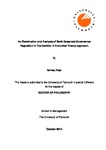An Examination and Analysis of Bank Corporate Governance Regulation in The Gambia: A Grounded Theory Approach
| dc.contributor.supervisor | Howell, Kerry | |
| dc.contributor.author | Faye, Sainey | |
| dc.contributor.other | Plymouth Business School | en_US |
| dc.date.accessioned | 2014-11-03T12:30:06Z | |
| dc.date.available | 2014-11-03T12:30:06Z | |
| dc.date.issued | 2014 | |
| dc.identifier | 10200993 | en_US |
| dc.identifier.uri | http://hdl.handle.net/10026.1/3155 | |
| dc.description | This item was replaced on 02.12.14 at the request of the author by NC TIS | |
| dc.description.abstract |
An Examination and Analysis of Bank Corporate Governance Regulation in The Gambia: A Grounded Theory Approach Abstract The purpose of this research is to carry out an empirical investigation of bank corporate governance regulation in The Gambia. The aim is to determine what contributions, if any, effective governance systems can make to the management of the needs of different stakeholder groups within the financial sector. Through the application of grounded theory methodology this research aims to build a substantive theory of corporate governance regulation within The Gambian banking sector. The substantive theory identified the main phenomena and as such outlined the model of corporate governance currently prevailing in The Gambian banking sector. The grounded theory methodology adopted for this research includes a three stage process of analysing data namely open coding, axial coding and selective coding. Firstly, through the application of comparative method in open coding semi structured interviews and focus groups discussions were conducted with senior bank executives, employees and customers, as well as regulators across The Gambian banking sector. Open coding process enables the development and identification of properties and dimensions. The interviews were informed by survey questionnaires designed to sensitise and gain access to the identified participants and subsequently guided the semi structured interview questionnaires and focus groups that followed. Secondly, through axial coding, the open categories were incorporated into wider categories. The use of the paradigm model establishes the relationship among these categories. This led to the development of the human factor model of bank corporate governance regulation in The Gambian banking system. Finally, selective coding identified the core category through the verification of the second set of semi structured interviews and established its’ relationship with other sub categories. The substantive theory was further explored Categorical Imperative theoretical framework leading to a more formal substantive theory that considers corporate governance issues of financial sector stakeholders. It concluded that there is no consistency between banks when it comes to corporate governance mechanisms and codes partly due to obstacles such as environment, culture and policies. Thus, regulatory compliance and ethics are therefore necessary to serve as a moral compass in the absence of a mandatory regulatory framework. Finally, this thesis also explored the phenomenon of corporate governance, grounded theory and Categorical Imperative in an unexplored context. Thus, providing a new approach to corporate governance understanding to inform and to improve corporate governance practice. The identification of the substantive theory will also help key stakeholders to address the challenges, thus, minimising the risk of bank failures and improve the corporate governance regulation framework in The Gambia. Finally, this research also proposed an ethical code of conduct for The Gambia. The proposed code of conduct will influence future behaviour and subsequently improve the robustness of the banking system. | en_US |
| dc.description.sponsorship | Kaplan Holborn College | en_US |
| dc.language.iso | en | en_US |
| dc.publisher | Plymouth University | en_US |
| dc.subject | Corporate Governance | en_US |
| dc.subject | Grounded Theory | |
| dc.subject | Regulation | |
| dc.subject | The Gambia | |
| dc.subject | Banking | |
| dc.title | An Examination and Analysis of Bank Corporate Governance Regulation in The Gambia: A Grounded Theory Approach | en_US |
| dc.type | Thesis | |
| plymouth.version | Full version | en_US |
| dc.identifier.doi | http://dx.doi.org/10.24382/4462 | |
| dc.identifier.doi | http://dx.doi.org/10.24382/4462 |
Files in this item
This item appears in the following Collection(s)
-
01 Research Theses Main Collection
Research Theses Main


